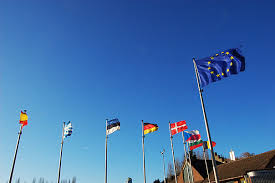UK demands longer N.Ireland Brexit grace periods ahead of EU talks
The United Kingdom demanded a two-year extension to grace periods for checks on goods going between Britain and Northern Ireland on Wednesday as European Union and British officials met to discuss problems over border arrangements following Brexit.

- Country:
- United Kingdom
The United Kingdom demanded a two-year extension to grace periods for checks on goods going between Britain and Northern Ireland on Wednesday as European Union and British officials met to discuss problems over border arrangements following Brexit. EU member Ireland backed the call for more flexibility.
As part of its Brexit agreement last year, Britain agreed to checks on some goods moving between British-ruled Northern Ireland and other parts of the United Kingdom. That let the land border between Northern Ireland and the rest of Ireland remain open with no checks. But the authorities in Northern Ireland complain that it has led to difficulty bringing in goods from other parts of the United Kingdom - and supermarkets have complained of shortages of some items.
British Cabinet Office minister Michael Gove, in charge of negotiating the rules around Northern Ireland, asked in a letter to his EU counterpart Maros Sefcovic that the bloc agree to extend and expand waivers on the movement of certain goods from Britain into Northern Ireland. "The arrangements that currently apply to supermarkets and their suppliers must be extended until at least 1 January 2023. The eligibility for these arrangements must also be adapted so that all relevant local businesses and services are able to be included as authorised traders," the letter said.
Gove and Sefcovic are due to hold talks on the issue later on Wednesday, along with Northern Ireland's first minister Arlene Foster of the Democratic Unionist Party and deputy first minister Michelle O’Neill of Sinn Fein. Ireland, which the EU is keen to shield from the effects of Brexit and whose views on relations with Britain and Northern Ireland are closely followed, expressed support for flexibility from the European Union on grace periods.
Irish Foreign Minister Simon Coveney also asked for issues around the transport of pets from Northern Ireland to be addressed. "From an Irish perspective we want there to be some flexibility here if it's possible to do that," Coveney told national broadcaster RTE.
Trade across the land border in Ireland was the most contentious issue of Britain's five-year Brexit negotiations. Ultimately, London agreed that Northern Ireland would remain in the EU single market and customs territory when the rest of the United Kingdom left on Jan. 1 this year. That means no checks are required on goods moving across the Irish land border, but they are needed on goods travelling between Northern Ireland and England, Scotland or Wales.
British supermarkets selling into Northern Ireland now have a three-month grace period, until the end of March, to adapt their systems for customs checks. But some Northern Irish outlets have already had shortages of fresh goods usually imported from Britain, and fear the situation could worsen. Many pro-British unionists in Northern Ireland oppose the new trade barriers introduced with rest of the United Kingdom.
Northern Ireland's devolved government temporarily suspended some inspections at the ports of Larne and Belfast on Monday. The EU also told its officials there not to come to work because of serious concerns about their safety, caused by a rise in "sinister and menacing behaviour" in recent weeks, including the appearance of graffiti describing port staff as "targets".
Tension increased last week when, driven by concerns about European COVID-19 vaccine supplies, the European Commission invoked emergency powers to announce it would check vaccines crossing the land border into Northern Ireland. The Commission quickly withdrew the idea after an uproar from Dublin, Belfast and London, but the blunder fuelled the British argument that the Northern Ireland protocol should be adjusted.
(This story has not been edited by Devdiscourse staff and is auto-generated from a syndicated feed.)
ALSO READ
Cricket-Ireland hand Pakistan a reality check before T20 World Cup
Former PCB chairman Ramiz Raja slams Pakistan pacers for performance against Ireland in 2nd T20I
Pakistan Leans into Aggression in 7-Wicket Win against Ireland, Leveling T20 Series
Pakistan captain Babar Azam bags huge record following victory over Ireland
Parts of UK immigration law not valid in Northern Ireland, High Court rules










